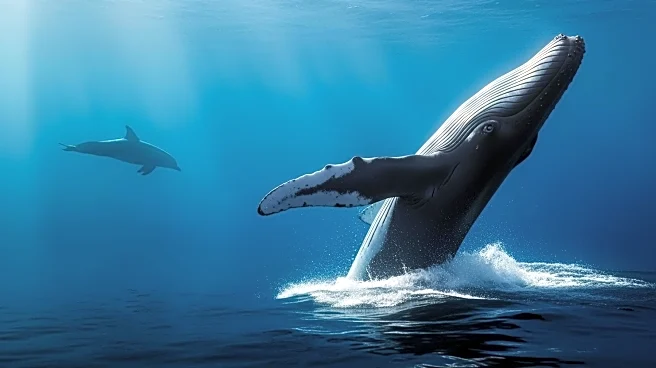What's Happening?
Recent research has identified the loss of the β3-adrenergic receptor gene in cetaceans, which may be linked to the development of their thick blubber. This gene loss is considered a significant evolutionary adaptation that allowed cetaceans to thrive
in cold aquatic environments. The study utilized a gene loss pipeline to screen for genes with premature stop codons and frameshifts in cetaceans, focusing on the common bottlenose dolphin and sperm whale. The research involved mapping human protein sequences to cetacean genomes and examining disruptions in gene coding sequences. The study also explored the adaptive evolution of the ADRB3 gene across 27 cetacean species, confirming inactivating mutations through genomic analysis and PCR amplification.
Why It's Important?
The findings provide crucial insights into the evolutionary biology of cetaceans, highlighting how genetic adaptations have enabled these marine mammals to survive in diverse and challenging environments. The loss of the β3-adrenergic receptor gene, which plays a role in thermogenesis, suggests a shift in how cetaceans regulate body temperature, relying on blubber for insulation. This research not only enhances understanding of cetacean physiology but also contributes to broader knowledge of mammalian evolution and adaptation. The study's implications extend to conservation efforts, as understanding genetic adaptations can inform strategies to protect these species in changing climates.
What's Next?
Future research may focus on further exploring the genetic basis of other physiological adaptations in cetaceans, such as deep diving capabilities and echolocation. Additionally, scientists may investigate how these genetic changes have influenced cetacean behavior and ecology. There is also potential for comparative studies with other marine mammals to identify common evolutionary strategies. Conservationists and policymakers might use this information to develop targeted protection measures for cetaceans, particularly in the face of climate change and habitat loss.
Beyond the Headlines
The study raises questions about the ethical implications of genetic research on wildlife, particularly concerning the potential for genetic engineering or manipulation. It also highlights the importance of preserving genetic diversity within species, as genetic adaptations are crucial for survival in changing environments. The research underscores the interconnectedness of genetic, environmental, and ecological factors in shaping the evolution of species.















